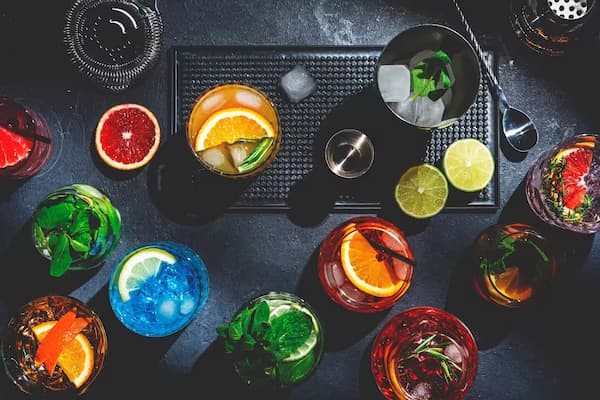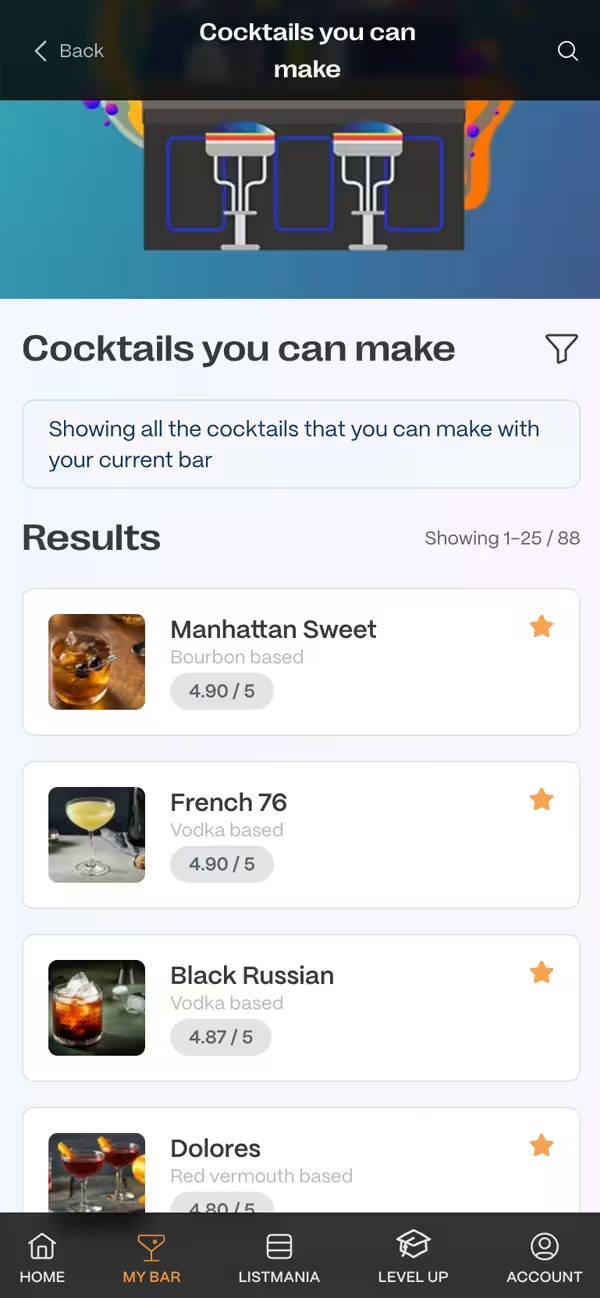Mango Liqueur
With Mango Liqueur you can make
Tropical indulgence, mango magic in every sip!
Mango Rum Punch
Overproof rum, Dark rum, Mango Liqueur, Mango Juice, Sugar / simple Syrup, Lime juice, Angostura Bitters
Tropical zest with herbal undertones.
Mango Basil Margarita
Tequila Reposado, Mango Liqueur, Lime juice, Agave syrup, Basil leaves
A tropical twist on the classic Negroni.
Mango Negroni
Gin, Campari, Mango Liqueur, White vermouth
We've got 3 cocktails that can be made with Mango Liqueur.
Find out what to make with Mango Liqueur
Q&A
What is the origin of mango liqueur?
Mango liqueur, known for its rich and tropical flavor profile, has roots in regions where mangoes are naturally abundant, such as South Asia, Southeast Asia, and parts of South and Central America. Although it's difficult to pinpoint the exact origin of mango liqueur due to the widespread cultivation of mangoes and the practice of fruit fermentation across different cultures, it is believed that the concept of fruit-based liqueurs, including mango, began to gain popularity in the 18th and 19th centuries as distillation techniques improved. Today, mango liqueur is produced worldwide, capturing the essence of mango in a bottle for cocktails and culinary uses.
What base spirits are commonly used in mango liqueur?
Mango liqueur is typically made by infusing mango flavors into a base spirit. The choice of base spirit can vary depending on the brand or homemade recipe but commonly includes vodka, rum, or neutral grain spirits. Vodka is favored for its neutral flavor, allowing the mango essence to shine through. Rum, especially white rum, is another popular choice, adding a subtle sweetness that complements the mango. Neutral grain spirits offer a high-proof, flavorless canvas that effectively captures the mango's richness and complexity.
How can one create a simple DIY version of mango liqueur at home?
Creating mango liqueur at home is surprisingly straightforward. You'll need ripe mangoes, a base spirit like vodka or white rum, sugar, and water. Begin by peeling and dicing the mangoes, then macerating them in the spirit for a few weeks in a sealed jar, shaking occasionally. After the infusion period, strain the mango pieces out, and prepare a simple syrup by dissolving sugar in boiling water. Cool the syrup, then mix it with the mango-infused spirit to taste. Allow it to marry for a few more days before enjoying your homemade mango liqueur.
Is there a non-alcoholic substitute for mango liqueur in cocktails?
For those seeking a non-alcoholic option that mimics the tropical sweetness of mango liqueur, a homemade mango syrup can be an excellent substitute. Simmer ripe mango pieces with water and sugar until the flavors are concentrated and the fruits are soft. Blend the mixture for a smooth texture and strain it to remove solids. Adjust sweetness to taste. This syrup can be used in cocktails to provide a similar mango flavor profile without the alcohol content. Store it in the refrigerator and use it as a flavorful addition to mocktails or as a drizzle in desserts.
What are some classic cocktails that feature mango liqueur?
Mango liqueur adds a tropical twist to many classic and contemporary cocktails. The Mango Margarita is a popular variation of the traditional margarita, blending the sweetness of mango with tequila's punch. A Tropical Martini, made with mango liqueur, vodka, and a splash of citrus, offers a crisp, refreshing taste. Adding mango liqueur to sparkling wine or prosecco creates a delightful Mango Mimosa, perfect for brunches or celebrations. Finally, a simple mix of mango liqueur with soda water or over ice serves as a refreshing drink on a hot day.
Mango Liqueur Brands
Ingredients like Mango Liqueur
Other Fruit Liqueurs
How it works
Easily create your bar from the ingredients you have at home, and we'll show you what you can make with the ingredients you have to hand.
Once you've added this ingredient head to your My bar page and fill up everything else you have.
We'll also show you cocktails that can make by substituting what you have for one of the ingredients you don't, riffing on the original. Now go forth and create something delicious!































